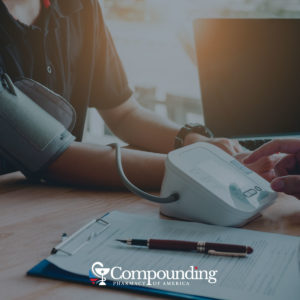 You’ve probably heard this name recently in commercials or even in TV shows or movies: statins. The obvious question that follows is, “What are statins?”
You’ve probably heard this name recently in commercials or even in TV shows or movies: statins. The obvious question that follows is, “What are statins?”
Statins are a class of medications that are typically prescribed for high cholesterol, although they do serve a few other purposes, which will we get to later. To find out more about this popular class of drugs, read through the following Q&A-styled information and then learn about how we can deliver compounded statin medications for your needs.
How Do Statins Work and What Are They Prescribed For?
Historically, doctors have prescribed statins to patients with high cholesterol levels. Statin use also happens to lower the risk of chest pain, heart attack and stroke. These medications work by inhibiting a liver enzyme that helps produce cholesterol.
The American Heart Association updated its guidelines in 2013 as to what statins can and should be used for, and so the prevalence of statin use has increased since then. Doctors now can choose to prescribe statins to:
- Patients who have had a heart attack or stroke
- Anyone who has a high level of harmful LDL (low-density lipoprotein, aka “bad” cholesterol)
- Those with diabetes between the ages of 40 and 75
- Patients with a greater than 7.5 percent risk of having a heart attack or stroke in the next 10 years, per a professional calculation
What Is the List of Stating Drugs – Generic and Brand Name?
Some of the generic names you might see for statin drugs include:
- Atorvastatin (highly potent)
- Rosuvastatin (highly potent)
- Cerivastatin
- Pravastatin
- Simvastatin
- Lovastatin
- Mevastatin
- Fluvastatin (least potent on this list)

And as far as brand names of statin drugs go, these are the most prominent (generic name mentioned in parentheses):
- Lipitor (atorvastatin)
- Crestor (rosuvastatin)
- Lescol (fluvastatin)
- Zocor (simvastatin)
- Pravachol (pravastatin)
- Vytorin (combination of simvastatin and ezetimibe)
What Are Statin Side Effects?
Almost every drug has side effects, and statins are no exceptions. People often ask, “What are the bad side effects of statin drugs?” Or, they sometimes even ask loaded questions such as, “Why are statins bad for you?”
Well, statins are the most effective drug for reducing bad cholesterol and the risk of heart disease, but they are not for everybody, and they do come with potential side effects such as:
- Muscle pain and damage
- Liver damage
- Kidney failure
- Digestive problems
- Sexual dysfunction
- Memory problems
- Nausea and vomiting
- Increase in blood sugar
On the bright side, only about 10 percent of statin users experience side effects, although research is still limited at this point.
Statins must be taken exactly as prescribed, and the patients need to inform their doctors of all other medications they take. People with progressive liver disease and pregnant and breastfeeding women should not take statins.
Why Do You Have to Take Statins at Night?
Most statins work better when taken in the evening or right before bed because they have a short half-life (approximately six hours). These statins include fluvastatin, lovastatin and simvastatin. Another reason for taking statins later in the day is because the cholesterol-making enzyme in your liver tends to be more active at night.
Which Statins Can Be Taken in the Morning?
Some of the newer statin drugs are just as effective when taken in the morning. Statins that do not need to be taken at night include atorvastatin and rosuvastatin, which have half-lives of at least 14 hours. Additionally, there are also extended-release versions of less-potent statins that patients can take at any time of the day; extended-release fluvastatin (Lesco XL) is an example of this.
What Foods Should Be Avoided When Taking Statins?
Grapefruits and grapefruit juice should be avoided while taking statin medications. There is a negative interaction between these two. Luckily, there doesn’t appear to be any other kind of food that directly causes such an adverse effect when taking statins.
Doctors typically recommend that patients who take statins should moderate their intake of food that is high in saturated fat. This makes statins’ job a little easier.
What Foods Are High in Statins?
There are also certain foods you can eat that will aid in the reduction of bad cholesterol. Food groups and types of foods to target for better cholesterol include:
- Legumes (especially peas, kidney beans and broad beans)
- Nuts (cashews and almonds, especially)
- Seeds (especially sesame seeds)
- Oils (rice bran oil, sesame oil, corn oil, canola oil, etc.)
- Grains (especially wheat germ)
- Bread (especially 100% rye bread, rice bran, brown rice and whole wheat)
- Vegetables (beet roots and Brussels sprouts, especially)
- Fruit (apples and oranges, especially)
- Fortified foods such as yogurt, milk, vitamin water, orange juice and energy bars
Can You Drink Alcohol While Taking a Statin?
Moderate alcohol consumption actually has shown some benefits in those with high cholesterol. But once somebody reaches the point where their doctor prescribes them a statin, they should be careful about their alcohol intake from then on.
Alcohol and statins both impact the liver, so if one is a heavy drinker and at risk of liver damage to due alcohol use, adding a statin medication to the mix is going to be detrimental.
Above all, it’s important to be transparent with your doctor about your level of alcohol use when you are diagnosed with high cholesterol. Your doctor can provide guidance on how to cut back or eliminate your alcohol use as begin taking a new cholesterol medication.
Can Taking Statins Cause Depression?
Despite some claims, statins do not appear to directly cause symptoms of depression. The link between these two is still being studied, but researchers have yet to find a strong connection. If anything, if someone starts taking statins for cholesterol due to a poor diet, that poor diet could be the more direct cause of any feelings of depression.
Statins may also get unfairly lumped in with beta blockers, which are medications that treat cardiac conditions. Beta blockers are known for aggravating depression, and it’s not uncommon for patients to be on both types of medication.

What Are the Advantages of Compounded Statin Medications?
If you’re looking for compounded statins, look no further than The Compounding Pharmacy of America. The advantages of using a compounding pharmacy to obtain your prescription statins include:
- We can alter the taste or form (such as from pill to liquid) of your medication to something more agreeable to you.
- You can have us customize the dose so it’s right at the level you need; pills from the manufacturer directly may be too strong or too weak for your needs.
- We can remove any additives that may cause a negative interaction in your system.
Discover how we can customize your statin medication by contacting us today, or learn more about our complete range of compounding services by clicking below.
See What We Can Compound for You
Chief Operating Officer, The Compounding Pharmacy of America
Matthew Poteet, Pharm.D. graduated with Honors from Lee University with a Bachelors of Science in Biological Science. After his undergraduate training, he completed the Doctor of Pharmacy program at Mercer University Southern School of Pharmacy, graduating in 2004. Dr. Poteet has spent much of his pharmacy career on staff at two of the most prestigious academic teaching hospitals in the Southeast; Emory University in Atlanta and Vanderbilt University Medical Center in Nashville. At these institutions he received extensive experience and training in sterile products compounding.
He returned home to East Tennessee in 2010, where he has held the position of Pharmacy Director at two sterile products pharmacies in Knoxville. Matthew lives in Knoxville with his wife, Chris. Dr. Poteet is Tennessee’s first Board Certified Anti-Aging Pharmacist by the American Academy of Anti-Aging Medicine.
 Subscribe to Our Newsletter
Subscribe to Our Newsletter


